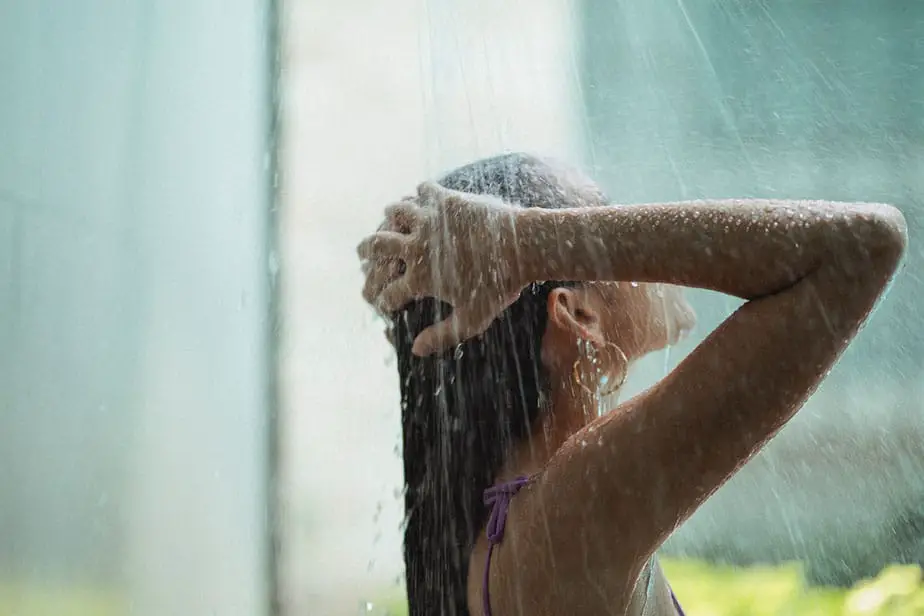Are you wondering if it’s bad to sleep after swimming? This is a common question that many swimmers ask themselves, and the answer isn’t as simple as one might think.

Sleeping after swimming is bad if you don’t wash off the chlorine from your hair and skin first and neglect to eat a post-workout meal. You may also find it hard to sleep too soon after swimming because your heart rate and metabolism will be elevated. It’s best to wait at least an hour or more before sleeping after swimming.
Keep reading on as we’ll be taking a closer look at the factors that can impact your sleep quality after swimming.
Is Sleeping after Swimming Bad?
Risks and Benefits
Swimming every day can have numerous health benefits for your body. Your cardiovascular system gets stronger, and you can burn calories while toning muscles throughout your body. It’s also known to have a positive impact on your sleep quality. However, there are a few risks to consider.
Whenever you swim, you expose your skin and hair to various elements, such as chlorine in a pool or salt and other minerals in the ocean.
Rinsing off with fresh water before going to bed is essential in order to reduce the risk of itching, drying, and damage to your skin and hair. If you don’t properly rinse and dry off after a swim, you might experience uncomfortable itching and irritation.
Moreover, your heart rate and metabolism may be elevated after a swim, making it harder for you to fall asleep. To counter this, try incorporating some relaxation techniques or light stretching before sleeping to calm your body and ease it into a restful state.
Swimming and Sleep Quality
When you incorporate swimming into your regular routine, you may notice improvements in your overall sleep quality. Regular exercise like swimming contributes to better sleep by reducing stress, anxiety, and increasing relaxation.
As an adult, you should allow your body ample time to recover after swimming. If you swim in the evening, try to give yourself at least an hour before bedtime to let your body cool down, stretch, and prepare for sleep.
Effects of Chlorine and Pool Chemicals
Impact on Hair and Skin
When you take a dip in a swimming pool, the chlorine used to disinfect the water can take its toll on your hair and skin.
This commonly used pool chemical can strip away moisture from your hair, leaving it brittle and prone to split ends. It also breaks down the natural protein in your hair, reducing its strength and endurance.
For your skin, chlorine may cause dryness and sensitivity, especially for those already prone to dry or sensitive skin. Moreover, the formation of chloramines – a byproduct of chlorine’s reaction with sweat, dirt, and skin cells – can cause itchiness and redness of the skin.
For these reasons, take the time to shower immediately after swimming, whether you were swimming in salt water, fresh water, or chlorinated water, to get rid of any irritants on your body. Otherwise, you may wake up with itchy, red skin, and dried out hair!
Preventing Itching and Redness

Here are some helpful tips to minimize the effects of pool chemicals on your hair and skin:
- Rinse your body with fresh water before and after swimming. This helps wash away impurities and reduces the amount of chlorine your skin absorbs.
- Apply a thin layer of natural oil, such as coconut or argan oil, to your hair before swimming. This acts as a barrier to protect your hair from chlorine and helps retain moisture.
- Use a swim cap to cover your hair, especially if you have color-treated or chemically treated hair.
- Shower using a gentle, moisturizing soap or body wash after swimming. This helps remove lingering pool chemicals and replenishes moisture to your skin.
- Moisturize your skin with a hydrating lotion or cream soon after showering. This helps lock in moisture and soothe any skin irritation caused by chlorine.
- Consider using a chlorine-neutralizing hair product or a deep conditioning treatment to restore your hair’s strength and moisture after swimming.
By keeping these tips in mind, you can enjoy the benefits of swimming while minimizing the adverse effects of chlorine and other pool chemicals on your hair and skin.
Preventing Post-Swimming Issues
Showering and Rinsing Off

You should rinse your body with fresh water after swimming at a minimum, but it’s even better if you use dedicated chlorine removal shampoo and conditioner for your hair.
For your skin, use a gentle soap or a chlorine removal body wash and don’t forget to moisturize your skin after showering to keep it hydrated and smooth.
Cooling Down and Relaxation Techniques
Once you’re clean and dry, it’s time to cool down and relax before going to sleep. Swimming makes your body temperature rise, which can make you feel tired and sleepy.
To avoid feeling too sleepy, try sipping on some ice water instead of a hot drink after your swimming session. This will help cool down your body temperature, making it easier for you to stay awake and alert.
Think about implementing some relaxation techniques into your post-swim routine. This can help ease any muscle tension or tightness, which may contribute to feeling tired after swimming.
Some options include deep breathing exercises, gentle stretches, and even a short yoga session to help your body and mind unwind.
By taking the time to properly shower and rinse off, as well as incorporating cooling down and relaxation techniques, you can prevent potential post-swimming issues and enjoy a restful night’s sleep without any adverse effects.
Sources:
- https://swimcompetitive.com/swimming/why-tired/
- https://sleepwelltips.com/is-it-bad-to-sleep-without-showering-after-swimming/
- https://www.thelist.com/224151/when-you-go-swimming-every-day-this-is-what-happens-to-your-body/
- https://sleepfoundation.org/sleep-topics/exercise-and-sleep
- https://www.swimnetwork.com/how-to-recover-quickly-from-swimming/
- https://www.everydayhealth.com/healthy-living/weird-things-chlorine-does-to-your-body-and-what-to-do-about-it/
- https://www.cdc.gov/healthywater/swimming/aquatics-professionals/chloramines.html
- https://www.triathlete.com/training/ask-a-pro-why-does-swimming-make-me-so-sleepy/

